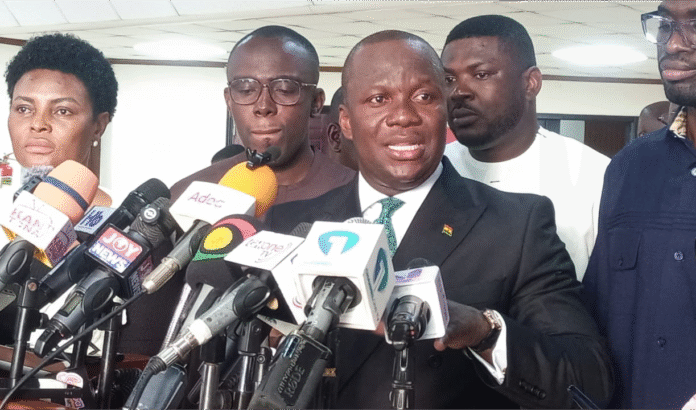Ranking Member on the Member of Parliament for Damongo, Samuel Abdulai Jinapor, has raised strong concerns over government’s plan to commit nearly $1.2 billion toward the purchase of six new aircraft for the Ghana Armed Forces.
His concerns follow heated exchanges in Parliament on Wednesday, November 19, 2025, during deliberations on the government’s proposal to retool the Ghana Air Force. The proposal outlines plans to procure four helicopters, two aircraft, and a naval vessel as part of a broader defence upgrade.
Speaking to journalists after proceedings, Mr. Jinapor—who serves as the Minority’s Ranking Member on Foreign Affairs—criticised both the scale of the spending and the timing. He argued that, in reality, the government is seeking to acquire four helicopters and two presidential-type aircraft at a total cost exceeding GH¢13 billion, a figure he considers unjustifiable amid current economic hardships.
He questioned whether the expenditure reflects the nation’s most urgent priorities.
“At a time when nurses await recruitment, arrears remain unpaid, farmers are struggling, and public sector workers have received just a nine percent salary increase—should this be our number one priority?” he asked.
Mr. Jinapor said discussions on the 2026 Budget revealed two critical concerns: whether the government indeed plans to acquire two new presidential jets alongside four helicopters, and what the actual cost burden will be for taxpayers.
According to him, the Finance Minister clearly outlined the components of the Air Force retooling programme, leaving no doubt about government’s intentions. The budget indicates procurement will begin in 2026 for four modern helicopters, one long-range aircraft, and one medium-range aircraft.
“The government’s intention, as captured in the budget, is explicit,” he said, adding that the Minister also explained the financing arrangement, which spreads deliveries and payments across four years.
Mr. Jinapor detailed the projected annual expenditure:
- GH¢2.6 billion in 2026
- GH¢3.5 billion in 2027
- GH¢3.3 billion in 2028
- GH¢3.5 billion in 2029
These commitments total GH¢13.1 billion. Using an exchange rate of GH¢11 to the dollar, he said the cost translates to $1.19 billion, and even at the Bank of Ghana’s lower benchmark of GH¢10.53, the figure climbs to $1.24 billion.
He stressed that transparency and accountability must guide decisions on national expenditure.
“As Members of Parliament—particularly on the Minority side—our constitutional duty is to hold government to account. We must scrutinise, analyse, and present the facts so Ghanaians understand how their taxes are being used and how the public purse is being managed,” Mr. Jinapor said.



